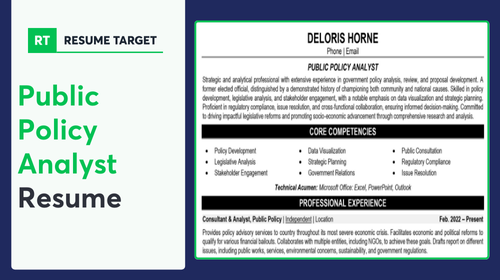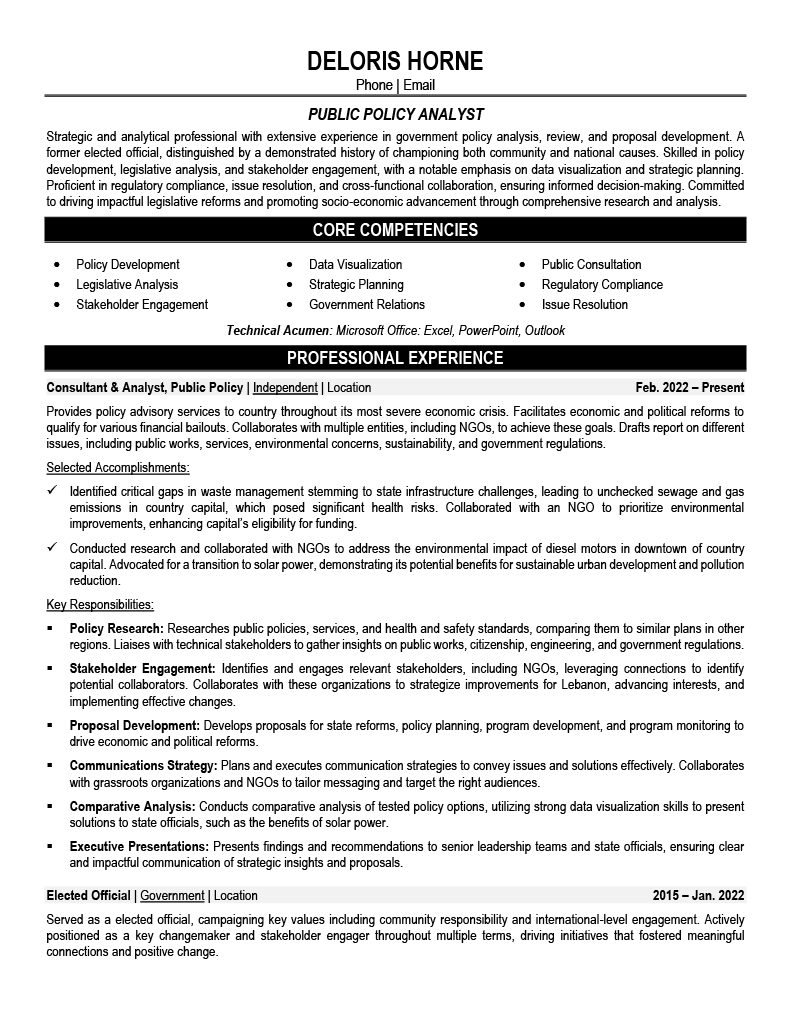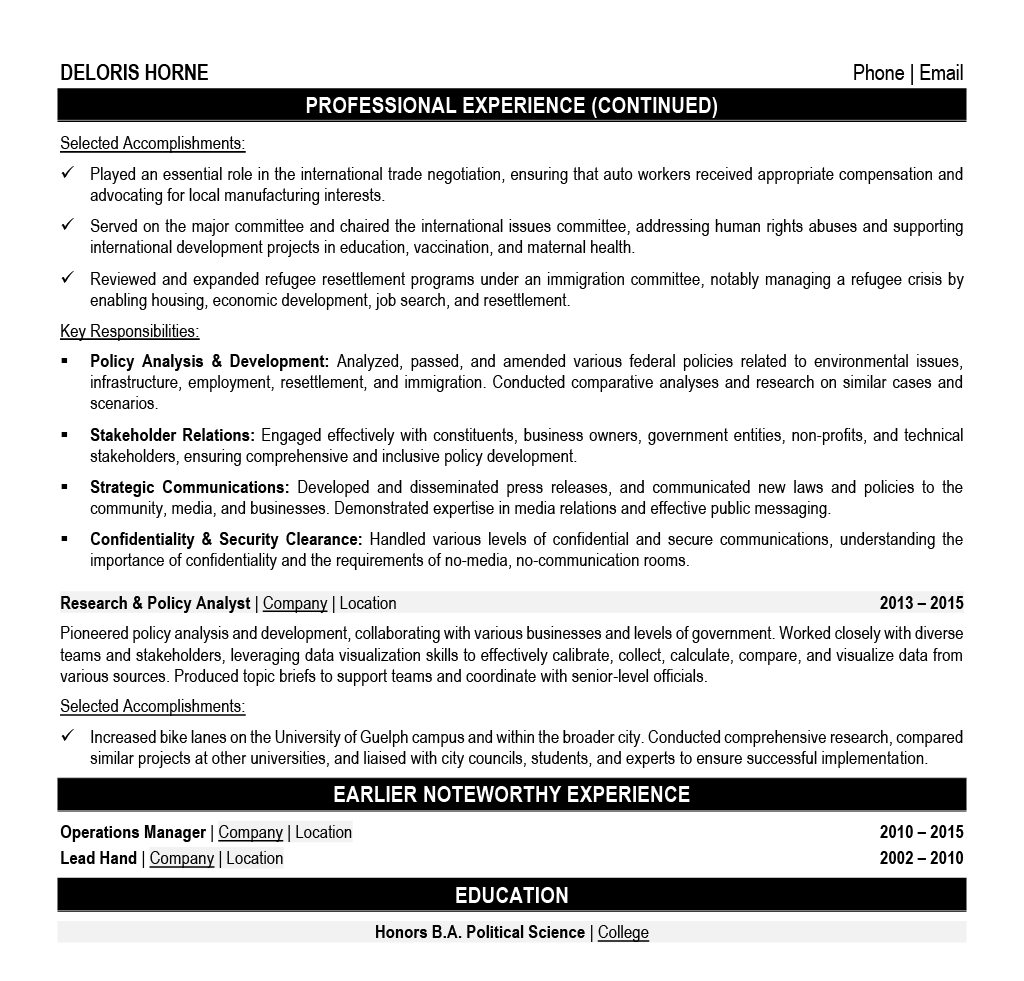

Policy analysis requires deep expertise, but most public policy resumes read like boring government memos. Your valuable insights and recommendations deserve better than getting lost in dense bureaucratic language.
Are you struggling to translate complex policy work into compelling resume content? You need a strategic approach that showcases your ability to drive real change through policy solutions while keeping hiring managers engaged.
Resume Target specializes in helping policy professionals communicate their impact clearly and powerfully. We'll help you transform dense policy work into crisp, achievement-focused content that demonstrates your ability to solve pressing public challenges.


At the intersection of data and democracy, Public Policy Analysts serve as the architects of informed decision-making, using factual research and analysis to shape policies that impact millions of lives across federal, state, and local levels.
These professionals dive deep into complex societal challenges, gathering evidence from multiple sources, crunching numbers, and transforming raw data into actionable policy recommendations that help government officials and lawmakers make better-informed decisions about everything from healthcare reform to environmental protection.
Whether you're passionate about social change or fascinated by the mechanics of government, a career as a Public Policy Analyst offers a dynamic path where your analytical skills can directly influence the laws and programs that shape our society - let's explore how you can build a career in this impactful field.
Let's talk about what's exciting in the Public Policy Analyst field! Your career path as a policy analyst offers compelling earning potential that grows significantly as you build your expertise and influence in shaping public policies. The compensation landscape is dynamic, rewarding both your educational achievements and the impact you make in public service.
Figures from: Claremont Lincoln University
Public Policy Analysts can advance from research roles to influential leadership positions that shape organizational strategy and public policy. Your progression depends on expertise development and proven impact in policy formation.
Beyond basic analytical capabilities, accelerating your policy career requires mastery of advanced statistical tools, strategic thinking, and the ability to influence key stakeholders through compelling policy recommendations.
- Data Analysis and Visualization (R, Stata, SPSS) - Policy Research and Economic Analysis - Legislative Process Knowledge - Program Evaluation - Statistical Modeling - Strategic Planning - Stakeholder Management - Communication and Presentation - Leadership and Team Building - Change Management - Cross-functional CollaborationBreaking into public policy analysis typically starts with a bachelor's degree in political science, economics, or public administration, combined with internships that provide hands-on experience in policy research and analysis.
To advance in this field, you'll need to develop a strong foundation in research and analytical skills, including qualitative and quantitative research methods, data collection, and statistical analysis, which you can build through roles like research assistant, policy coordinator, or junior analyst positions.
Requirements from Teal HQ
From federal agencies to local governments, policy analysts find diverse opportunities across public and private sectors.
Figures from Beyond Berea
Note: While specific geographic data is limited, the distribution of public policy analyst roles typically follows government centers and major metropolitan areas where policy work is concentrated. The federal government remains the largest employer, accounting for 70% of positions when combining civilian and military sectors.Struggling to translate your complex policy research, stakeholder engagement, and legislative analysis into a compelling resume that catches a hiring manager's attention? This comprehensive, section-by-section guide will show you exactly how to craft a public policy analyst resume that highlights your most impressive achievements and demonstrates your ability to drive meaningful policy change.
Writing a compelling resume summary can feel as complex as analyzing multi-stakeholder policy initiatives, but don't let that stop you from creating one that truly showcases your expertise.
While you excel at breaking down complex policy issues and translating data into actionable recommendations, capturing your analytical prowess and policy expertise in a few powerful sentences requires a strategic approach that speaks directly to what hiring managers are seeking.
How would you characterize your overall approach to analyzing and influencing policy decisions across different levels of government and stakeholder groups?
Reason: This helps frame your high-level strategic perspective and demonstrates your understanding of the policy ecosystem. It allows you to position yourself as either a specialist or generalist in the field.
What unique combination of policy areas, research methodologies, and stakeholder engagement approaches have shaped your effectiveness as a policy analyst?
Reason: This question helps synthesize your technical and soft skills into a cohesive value proposition that distinguishes you from other analysts in the field.
How would you describe your role in bridging the gap between complex policy research and actionable recommendations for decision-makers?
Reason: This helps articulate your ability to translate technical analysis into practical solutions, which is a crucial differentiator for senior policy analysts and a key concern for potential employers.
As a public policy analyst, you need to showcase both your analytical capabilities and your ability to translate complex policy issues into actionable recommendations.
Your skills section should balance technical expertise like statistical analysis and policy research methods with essential soft skills such as stakeholder communication and cross-functional collaboration.
Showcase your policy expertise by organizing your experience into three powerful sections: a high-level role overview that establishes your policy focus, measurable achievements that highlight your impact on legislation and programs, and core responsibilities that demonstrate your analytical and stakeholder management capabilities.
Many Public Policy Analysts struggle to translate complex policy initiatives and research findings into clear, measurable impacts on organizational objectives. Transform your policy work into compelling achievements by connecting your analysis and recommendations directly to improved outcomes, cost savings, or enhanced public engagement metrics.
The responsibilities section demonstrates how Public Policy Analysts shape policy decisions through research, analysis, and strategic recommendations. Your duties should show how you bridge complex policy issues with practical solutions while highlighting your impact on organizational and public outcomes.
Your educational background and professional certifications demonstrate your expertise in policy analysis and research methodology. Prioritize your most relevant degrees in public policy, political science, or economics, along with any specialized certifications in policy analysis tools or research methods.
Now that you've created a strong foundation using Resume Target's comprehensive resume writing guidelines, you're ready to transform your resume into a powerful tool for public policy positions.
While many policy professionals focus solely on crafting the perfect cover letter, customizing your resume for each specific public policy role is equally crucial for standing out in this competitive field.
A tailored public policy resume not only helps you navigate through ATS systems by incorporating relevant keywords, but it also demonstrates to hiring managers how your specific policy research, analysis, and advocacy experience aligns perfectly with their organization's mission and needs.
Ready to make your public policy expertise shine? Let's turn your resume into a compelling story that shows employers you're exactly the policy expert they've been searching for!
Don't let a lack of professional experience hold you back from launching your career as a Public Policy Analyst!
Your academic background, research projects, and analytical skills can create a compelling story that showcases your potential to make an impact in public policy.
Focus on highlighting your policy research experience, data analysis capabilities, and understanding of legislative processes to stand out.
For more guidance on structuring your entry-level resume, check out the Student Resume Writing Guide to ensure you're presenting your qualifications effectively.
Your summary section is your chance to showcase how your academic excellence, research projects, and policy-focused internships have prepared you for a dynamic career in public policy.
Focus on highlighting your analytical capabilities, research methodology expertise, and passion for evidence-based policymaking to stand out as a promising candidate.
"Detail-oriented and research-driven Public Policy graduate with comprehensive training in policy analysis and program evaluation through academic projects and internships. Demonstrated experience conducting quantitative research, analyzing legislative proposals, and preparing policy briefs during state government internship. Proficient in statistical analysis software, data visualization, and policy impact assessment methodologies. Seeking to leverage strong analytical and communication skills to contribute meaningful insights as a Public Policy Analyst."
Now's your chance to showcase the rigorous academic foundation that prepared you for a career analyzing complex policy issues and crafting data-driven solutions!
Don't just list your degree - highlight relevant coursework like Policy Research Methods and Legislative Analysis, plus spotlight impactful projects where you evaluated real policy initiatives or conducted original research that demonstrates your analytical capabilities.
The search indicated several courses and subjects common in Public Policy Analyst education, emphasizing the need for a solid understanding of political science, economics, and various related fields.Relevant Coursework: Public Policy Analysis | Microeconomics | Statistical Methods | Policy Research Methods | Program Evaluation | Public Administration
Key Projects:
Urban Housing Policy Analysis: Conducted comprehensive research and analysis of affordable housing initiatives in metropolitan areas, resulting in evidence-based policy recommendations for local government implementation.
Environmental Policy Impact Assessment: Collaborated with a team of four researchers to evaluate the effectiveness of recent clean energy incentive programs and their economic implications.
Leverage your academic research experience, internship projects, and analytical capabilities to create a compelling skills section that showcases your ability to evaluate policy initiatives and contribute meaningful insights to public sector organizations.
As an aspiring Public Policy Analyst, your combination of analytical skills and policy knowledge positions you well for roles where you can help shape evidence-based solutions to complex social challenges while building a rewarding career in public service.
Let's face it - translating complex policy initiatives and program impacts into clear, compelling achievements can feel like navigating a legislative maze without a map.
At Resume Target, we specialize in crafting resumes for policy professionals who shape government programs and public initiatives, helping them showcase their true impact.
Our proven track record includes helping countless policy analysts land roles at prestigious government agencies and think tanks by transforming their complex work into clear, quantifiable achievements.
With budget seasons approaching and new administration priorities creating fresh opportunities, now is the perfect time to elevate your career story - connect with us today for a free consultation.
Impress any hiring manager with our Government resume writing service. We work with all career levels and types of Government professionals.
Learn More → Government Resume Writing Services